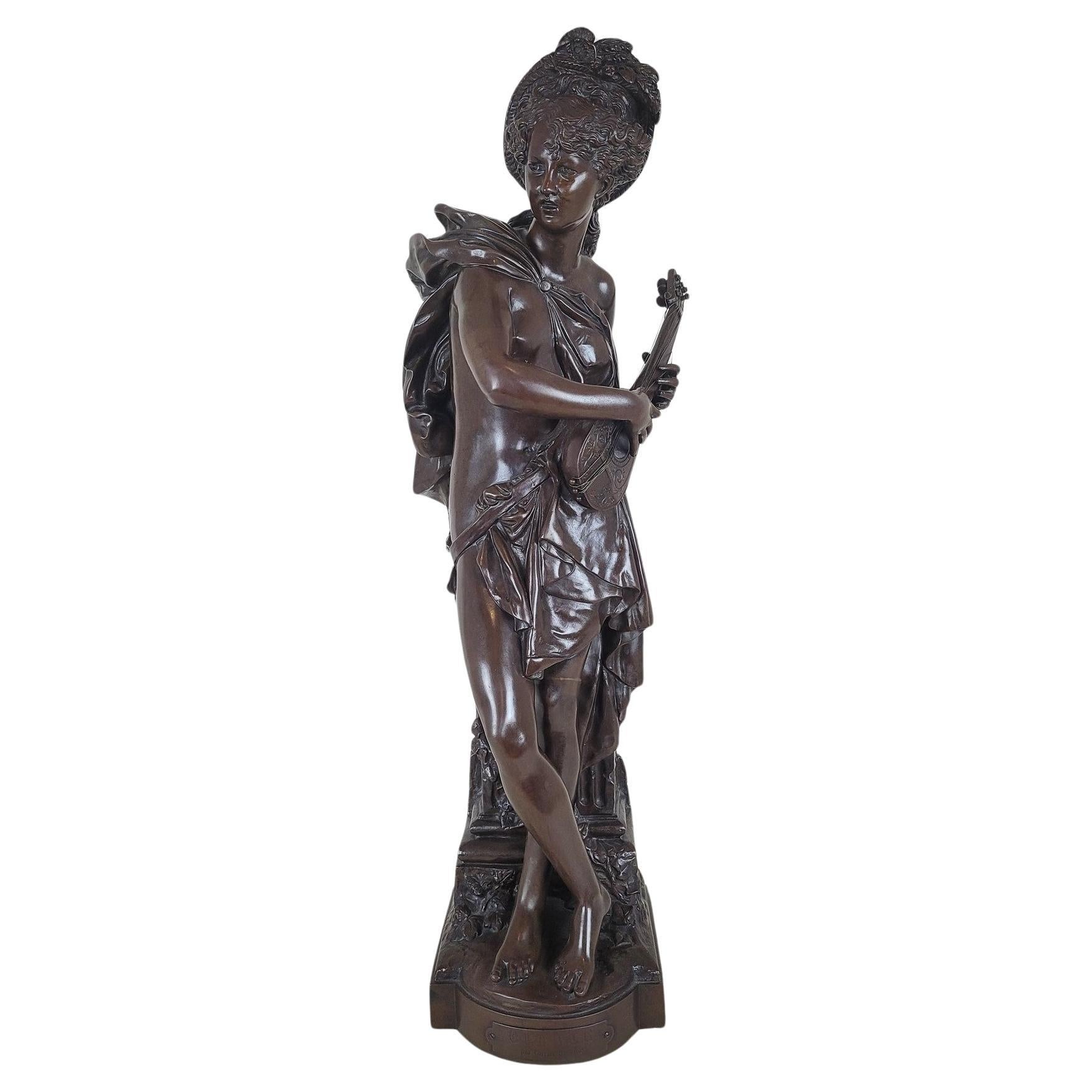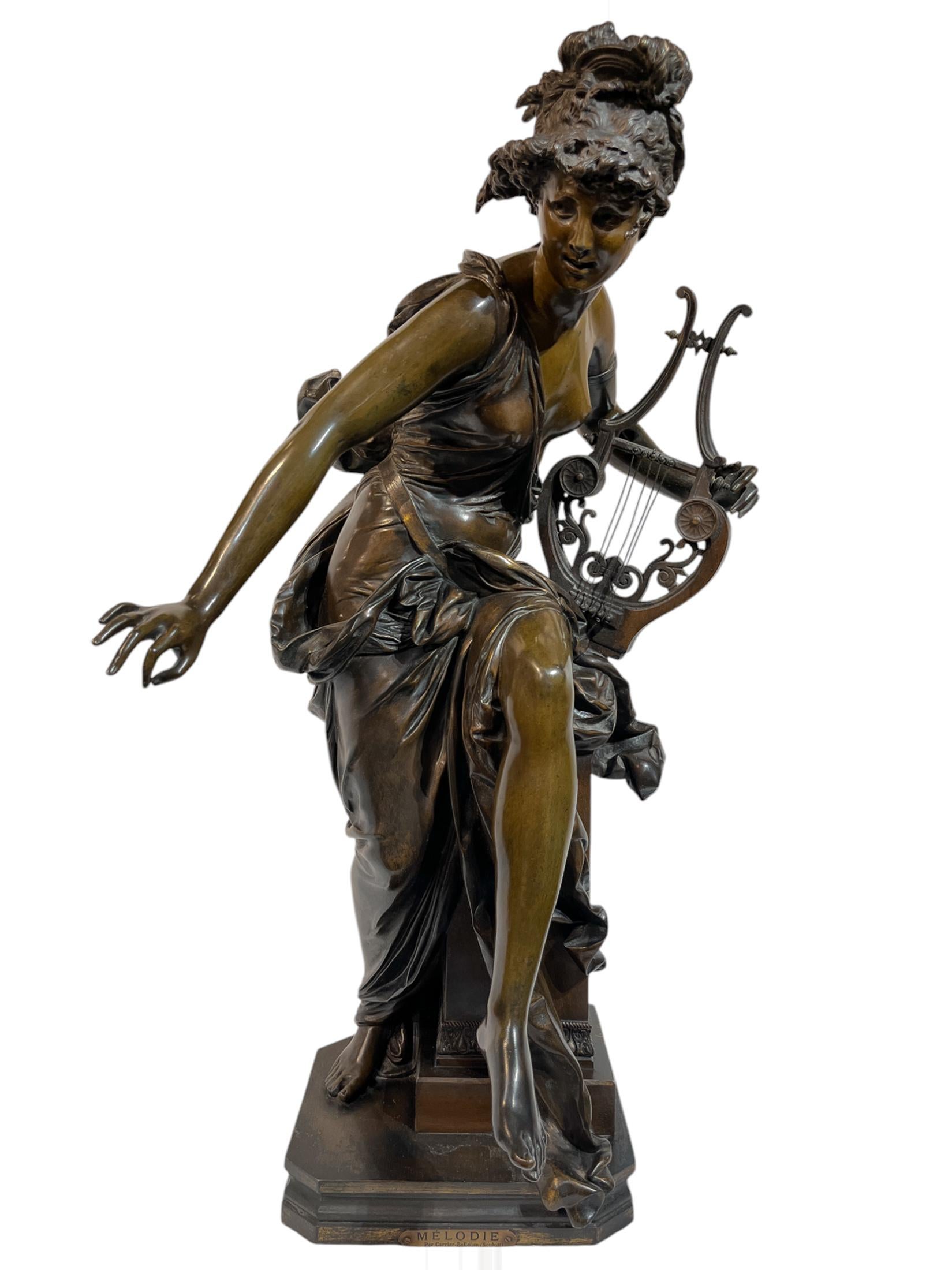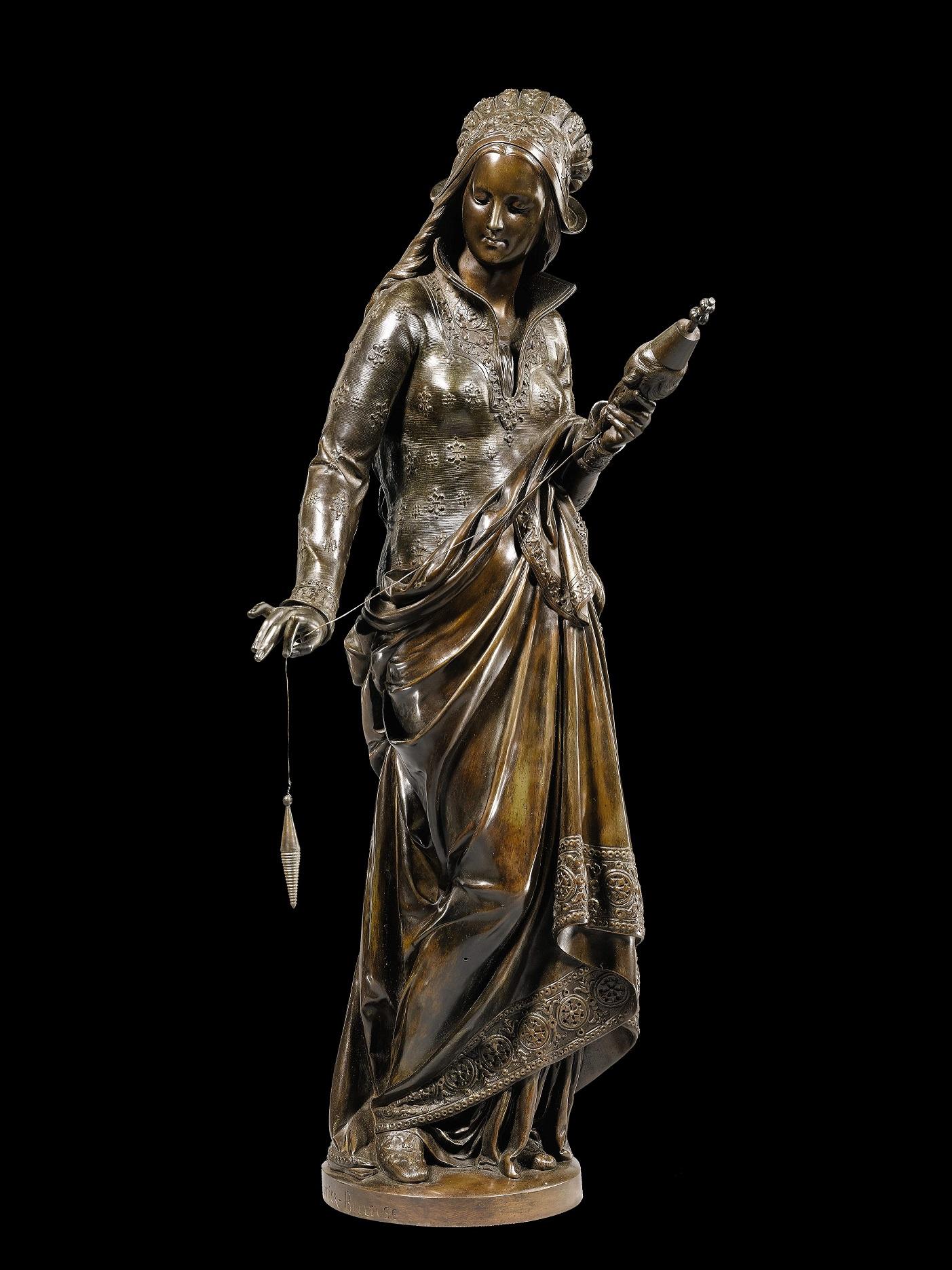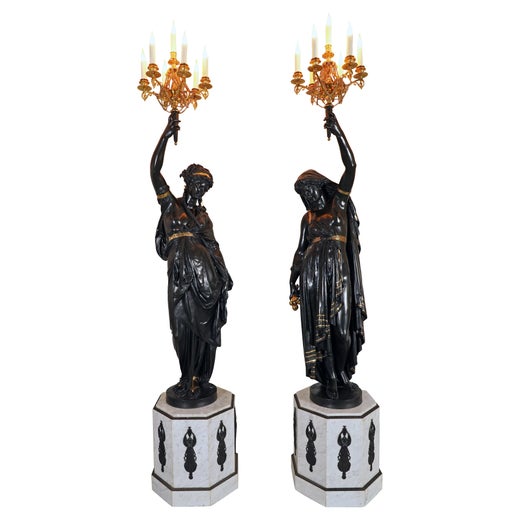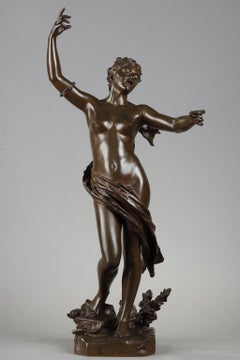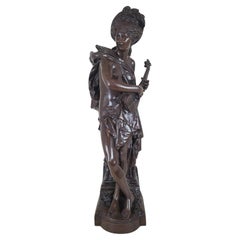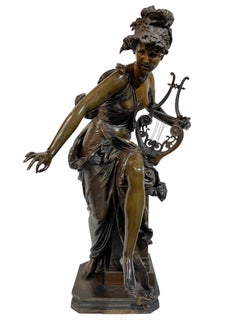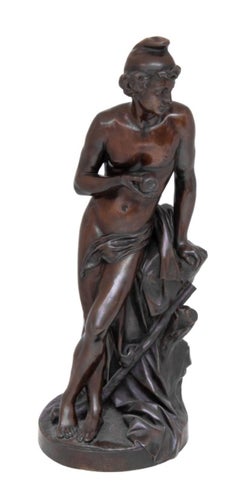Items Similar to Cigale
Want more images or videos?
Request additional images or videos from the seller
1 of 16
Albert-Ernest Carrier-BelleuseCigalecirca 1870
circa 1870
$13,441.79
£10,014.56
€11,300
CA$18,858.71
A$20,720.32
CHF 10,685.34
MX$248,250.41
NOK 135,670.89
SEK 127,321.62
DKK 86,083.07
About the Item
Cigale (Cicada)
by Albert-Ernest CARRIER-BELLEUSE (1824-1887)
Bronze sculpture with nuanced dark brown patina
signed "A. Carrier-Belleuse"
old edition cast
France
circa 1870
height 69,5 cm
width 24 cm
depth 20 cm
Biography :
Albert-Ernest Carrier de Belleuse known as Carrier-Belleuse (1824-1887) was one of the most prolific artists of the century and had the greatest successes under the Second Empire, enjoying the personal support of Napoleon III. His work was greatly influenced by the style of the Italian Renaissance and that of the 18th century, which he helped to bring up to date.
In 1837, the young Carrier-Belleuse apprenticed in the workshop of the engraver Bauchery. He was admitted soon after to the goldsmith Jacques Henri Fauconnier. Through François Arago, he met the sculptor David d'Angers who facilitated his admission to the School of Fine Arts. Carrier-Belleuse entered it in 1840. Noted for his skill by the great bronze companies in Paris such as Barbedienne and Denière, he soon received numerous orders for models for candelabras, pendulums, fittings for fireplaces, etc. In 1848, probably at the initiative of François Arago, who became head of state, he received his first public order for a small statue of "Mademoiselle Rachel singing La Marseillaise". In 1851, he appeared for the first time at the Salon of French Artists, where he presented two bronze medallions. From 1851 to 1855, Carrier-Belleuse stayed in England, in Stoke-on-Trent where he served as director of the modeling and drawing school of the Minton house, a large porcelain manufacturer.
Back in France, Carrier-Belleuse moved to Paris in a large workshop located 15 rue de la Tour d´Auvergne. From 1857, he made regular sendings to the Salon and became famous thanks to the success of large marbles, such as the "Bacchante" exhibited at the Salon in 1863, and acquired by Napoleon III, "Angelica" (1866) or even "Hebe asleep" (1869). At the Salon of 1867, his group entitled "Messiah" earned him the medal of honor of sculpture. It was acquired by the State to adorn the Chapel of the Virgin in the Saint-Vincent-de-Paul church.
Carrier-Belleuse acquired a great reputation in parallel for his terracotta busts which, in many respects, recall those of 18th century artists. He made portraits of a large number of celebrities of his time. He produced, among others, the busts of Napoleon III, Renan, Thiers, Grévy, Arago, Marguerite Bellanger, Théophile Gautier, Honoré Daumier, Delacroix, Hortense Schneider, Réjane… He also modelled numerous busts of mythological inspiration and historical and artistic portraits like Marie Stuart, Shakespeare or even Mozart.
Carrier-Belleuse used and trained in his workshop in the rue de la Tour d´Auvergne many young talented artists such as Alexandre Falguière, Jules Desbois, Eugène Delaplanche, Jules Dalou or Joseph Chéret; but he was best known for having been the master of Auguste Rodin who entered his studio as a practitioner in 1864.
Carrier-Belleuse devoted himself a lot to decorative sculpture. He contributed to the decorations of many important buildings. We owe him in particular the caryatids of the Renaissance theater in Paris, the pediment of the main entrance to the Banque de France, the stucco ceilings of the Lesdiguières and La Trémoïlle pavilions at the Louvre Palace, the frieze of the Palais de la Bourse in Brussels, or the decoration of the Hôtel de la Païva on the Champs-Elysées in Paris. He also received State commissions for monuments: that of Jean-Jacques Rousseau in Montmorency, of Alexandre Dumas, in Villers-Cotterêts, of Masséna in Nice. Abroad, he produced the equestrian statue of Michael the brave in Bucharest and the tomb of José de San Martín in Buenos Aires.
In 1873, Carrier-Belleuse took part in the construction of the Paris Opera house, directed by his friend Charles Garnier. He created the two monumental torchieres flanking the grand staircase in the main hall and the caryatids of the chimney of the grand foyer. In 1875, he was appointed director of works of art at the Porcelain Manufacture de Sèvres. He imprinted on it a very modern impulse which manifested itself in the creation of a complete range of vases.
- Creator:Albert-Ernest Carrier-Belleuse (1824 - 1887, French)
- Creation Year:circa 1870
- Dimensions:Height: 27.37 in (69.5 cm)Width: 9.45 in (24 cm)Depth: 7.88 in (20 cm)
- Medium:
- Movement & Style:
- Period:
- Condition:
- Gallery Location:PARIS, FR
- Reference Number:Seller: N.73821stDibs: LU2514215500102
Albert-Ernest Carrier-Belleuse
Albert-Ernest Carrier-Belleuse was a French sculptor. Carrier-Belleuse was born on 12th June 1824 at Anizy-le-Château, Aisne, France. He began his training as a goldsmith's apprentice. He was a student of David d'Angers and briefly studied at the École des Beaux-Arts. His career is distinguished by his versatility and his work outside France, in England between 1850–55 and in Brussels around 1871. His name is perhaps best known because Auguste Rodin worked as his assistant between 1864 and 1870. The two traveled to Brussels in 1871 and by some accounts, Rodin assisted Carrier-Belleuse's architectural sculpture for the Brussels Stock Exchange.
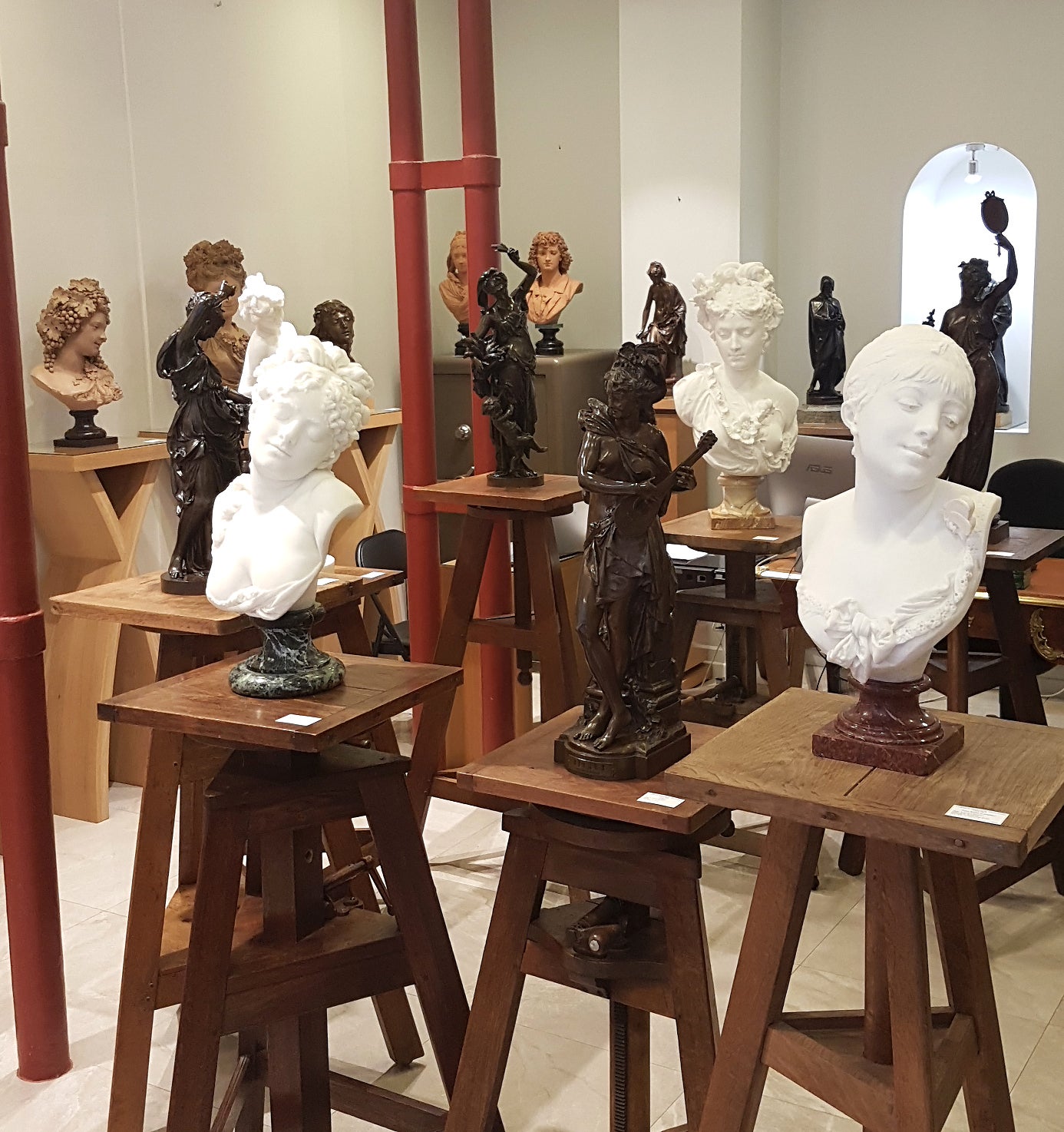
About the Seller
5.0
Recognized Seller
These prestigious sellers are industry leaders and represent the highest echelon for item quality and design.
Gold Seller
Premium sellers maintaining a 4.3+ rating and 24-hour response times
Established in 1992
1stDibs seller since 2023
10 sales on 1stDibs
Typical response time: 12 hours
- ShippingRetrieving quote...Shipping from: PARIS, France
- Return Policy
Authenticity Guarantee
In the unlikely event there’s an issue with an item’s authenticity, contact us within 1 year for a full refund. DetailsMoney-Back Guarantee
If your item is not as described, is damaged in transit, or does not arrive, contact us within 7 days for a full refund. Details24-Hour Cancellation
You have a 24-hour grace period in which to reconsider your purchase, with no questions asked.Vetted Professional Sellers
Our world-class sellers must adhere to strict standards for service and quality, maintaining the integrity of our listings.Price-Match Guarantee
If you find that a seller listed the same item for a lower price elsewhere, we’ll match it.Trusted Global Delivery
Our best-in-class carrier network provides specialized shipping options worldwide, including custom delivery.More From This Seller
View AllCaress of Love
By Albert-Ernest Carrier-Belleuse
Located in PARIS, FR
"Caress of Love"
by Albert-Ernest CARRIER-BELLEUSE (1824-1887)
Bronze group sculpture with a nuanced dark brown patina
Signed on the back "A. Carrier-Belleuse"
Reposing on its orig...
Category
1870s French School Figurative Sculptures
Materials
Bronze
The Birth of Venus
By Albert-Ernest Carrier-Belleuse
Located in PARIS, FR
The Birth of Venus
by Albert-Ernest CARRIER-BELLEUSE (1824-1887)
Bronze sculpture with dual patina, nuanced dark brown and gilded patina
signed "A. Carrier-Belleuse"
France
circa ...
Category
1870s French School Figurative Sculptures
Materials
Bronze
The Birth of Venus
By Albert-Ernest Carrier-Belleuse 1
Located in PARIS, FR
The Birth of Venus
by Albert-Ernest CARRIER-BELLEUSE (1824-1887)
Bronze sculpture with nuanced dark brown patina
signed "A. Carrier-Belleuse"
cast by Denière
France
circa 1870
he...
Category
Late 19th Century French School Figurative Sculptures
Materials
Bronze
The Song
By Félix Charpentier
Located in PARIS, FR
"The Song" by Félix Charpentier (1858-1924)
A very fine bronze sculpture with nuanced dark brown patina
Signed "Fx. Charpentier"
Cast by "E. Colin & Cie Paris"
France
around 1900
he...
Category
Early 1900s Art Nouveau Figurative Sculptures
Materials
Bronze
Suzanne
By Aimé-Jules Dalou
Located in PARIS, FR
Bathing woman drying her right foot
also known as "Suzanne"
by Aimé-Jules DALOU (1838-1902)
A bronze sculpture with a nuanced dark brown patina
Signed on the base " Dalou "
A very...
Category
Early 20th Century French School Figurative Sculptures
Materials
Bronze
Bathing woman surprised
By Aimé-Jules Dalou
Located in PARIS, FR
Bathing woman surprised
by Aimé-Jules DALOU (1838-1902)
A bronze sculpture with a nuanced dark brown patina
Signed to the rear " Dalou "
A very fine cast by " Susse Fres " (with t...
Category
Early 20th Century French School Nude Sculptures
Materials
Bronze
You May Also Like
Carrier-belleuse, Cigale, Large Signed Bronze, 19th Century
By Albert-Ernest Carrier-Belleuse
Located in MARSEILLE, FR
"Cigale" large bronze with brown patina of a mandolin player, leaning against a wall
This sculpture is titled and signed A Carrier-Belleuse
Beautiful patina and good quality of wor...
Category
Antique 19th Century French Napoleon III Figurative Sculptures
Materials
Bronze
Albert Ernest Carrier-Belleuse A Figural Bronze Sculpture Melodie
By Albert-Ernest Carrier-Belleuse
Located in New York, NY
Albert-Ernest Carrier-Belleuse (1824 - 1887)
Female Figural Bronze Sculpture Melodie (Melody)
A young lady with a lyre in bronze with a dark green patina
19th Century
31" H x ...
Category
19th Century Figurative Sculptures
Materials
Bronze
La Fileuse
By Albert-Ernest Carrier-Belleuse
Located in London, GB
signed 'A. CARRIER-BELLEUSE' (on base)
Category
Mid-19th Century Figurative Sculptures
Materials
Bronze
Émile Louis Picault Bronze Sculpture
By Émile Louis Picault
Located in Astoria, NY
Emile Louis Picault (French, 1833-1915) "Paris" Patinated Bronze Sculpture, late 19th century, the standing figure holding a golden apple, signed to base. 32" H x 12" W x 12" D. The ...
Category
Late 19th Century Art Nouveau Figurative Sculptures
Materials
Bronze
"Raphael"
By Auguste-Joseph Carrier
Located in Astoria, NY
Auguste-Joseph Carrier (French, 1800-1875) "Raphael" Patinated Bronze Sculpture, mid-19th century, depicting the Old Master Raffaello Sanzio da Urbino, cast by "Deniere" fondeur, on ...
Category
Mid-19th Century French School Figurative Sculptures
Materials
Bronze
Mathurin Moreau Bronze Allegorical Sculpture
By Mathurin Moreau
Located in New York, NY
MATHURIN MOREAU
French, (1822-1912)
‘La Libellule’
signed ‘Moreau Mathurin’
27 1/2 in. 11 1/2 in. x 15 in.
Notes: A fine quality Art Nouveau alleg...
Category
19th Century Figurative Sculptures
Materials
Bronze
More Ways To Browse
Antique Bronze Nude
Antique Bronze Medallions
Carrier Belleuse
Albert Ernest Carrier Belleuse
Small Antique Statue
Paris Opera House
Bust Of Napoleon
A Carrier Belleuse
Alexandre Falguiere
Carrier Belleuse Bronze
A Carrier Sculpture
Antique Cicada
A Carrier Bronze
Vincent De Paul
Eugene Delaplanche
Piano Artwork
Planetary Folklore
Pomeranian Dog
